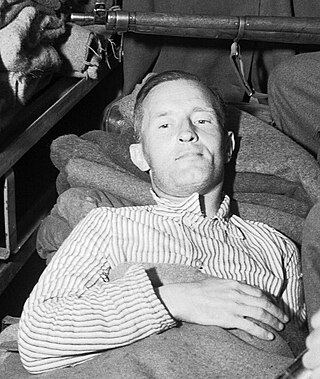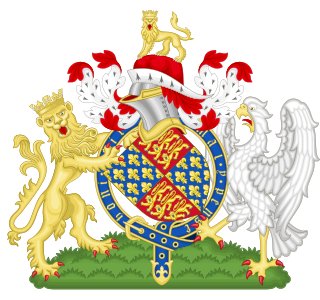A grand jury is a jury—a group of citizens—empowered by law to conduct legal proceedings, investigate potential criminal conduct, and determine whether criminal charges should be brought. A grand jury may subpoena physical evidence or a person to testify. A grand jury is separate from the courts, which do not preside over its functioning.

Under the law of the United Kingdom, high treason is the crime of disloyalty to the Crown. Offences constituting high treason include plotting the murder of the sovereign; committing adultery with the sovereign's consort, with the sovereign's eldest unmarried daughter, or with the wife of the heir to the throne; levying war against the sovereign and adhering to the sovereign's enemies, giving them aid or comfort; and attempting to undermine the lawfully established line of succession. Several other crimes have historically been categorised as high treason, including counterfeiting money and being a Catholic priest.

The Treason Act 1351 is an Act of the Parliament of England which codified and curtailed the common law offence of treason. No new offences were created by the statute. It is one of the earliest English statutes still in force, although it has been very significantly amended. It was extended to Ireland in 1495 and to Scotland in 1708. The Act was passed at Westminster in the Hilary term of 1351, in the 25th year of the reign of Edward III and was entitled "A Declaration which Offences shall be adjudged Treason". It was passed to clarify precisely what was treason, as the definition under common law had been expanded rapidly by the courts until its scope was controversially wide. The Act was last used to prosecute William Joyce in 1945 for collaborating with Germany in World War II.

The Criminal Lunatics Act 1800 was an Act of the Parliament of Great Britain that required and established a set procedure for the indefinite detention of mentally ill offenders. It was passed through the House of Commons in direct reaction to the trial of James Hadfield, who attempted to assassinate King George III.

The Treason Act 1695 is an Act of the Parliament of England which laid down rules of evidence and procedure in high treason trials. It was passed by the English Parliament but was extended to cover Scotland in 1708 and Ireland in 1821. Some of it is still in force today.

The Sedition Act 1661 was an Act of the Parliament of England, although it was extended to Scotland in 1708. Passed shortly after the Restoration of Charles II, it is no longer in force, but some of its provisions continue to survive today in the Treason Act 1695 and the Treason Felony Act 1848. One clause which was included in the Treason Act 1695 was later adapted for the United States Constitution.

The Treason Act 1945 was an Act of the Parliament of the United Kingdom.

The Treason Act 1800 was an Act of the Parliament of the Kingdom of Great Britain. It assimilated the procedure on trials for treason and misprision of treason to the procedure on trials for murder in certain cases. It was passed as a result of an attempt on the life of George III by James Hadfield earlier that year. The Criminal Lunatics Act 1800 was passed at the same time.

The Treason Act 1708 is an Act of the Parliament of Great Britain which harmonised the law of high treason between the former kingdoms of England and Scotland following their union as Great Britain in 1707.

The Succession to the Crown Act 1707 is an Act of Parliament of the Parliament of Great Britain. It is still partly in force in Great Britain.

The Treason (Ireland) Act 1821 is an Act of the Parliament of the United Kingdom. It extended most of the English Treason Act 1695 to Ireland. Previously the 1695 Act only applied to England and Scotland.

The Treason Act 1547 was an Act of the Parliament of England. It is mainly notable for being the first instance of the rule that two witnesses are needed to prove a charge of treason, a rule which still exists today in the United States Constitution.

The Forgery Act 1861 is an Act of the Parliament of the United Kingdom of Great Britain and Ireland. It consolidated provisions related to forgery from a number of earlier statutes into a single Act. For the most part these provisions were, according to the draftsman of the Act, incorporated with little or no variation in their phraseology. It is one of a group of Acts sometimes referred to as the Criminal Law Consolidation Acts 1861. It was passed with the object of simplifying the law. It is essentially a revised version of an earlier consolidation Act, the Forgery Act 1830, incorporating subsequent statutes.

The Incitement to Mutiny Act 1797 was an Act passed by the Parliament of Great Britain. The Act was passed in the aftermath of the Spithead and Nore mutinies and aimed to prevent the seduction of sailors and soldiers to commit mutiny.

The Jurors (Scotland) Act 1745 was an Act of the Parliament of Great Britain, passed during the Jacobite Rising of 1745. Its long title was "An Act for the more easy and speedy Trial of such Persons as have levied, or shall levy War against His Majesty; and for the better ascertaining the Qualifications of Jurors in Trials for High Treason or Misprision of Treason, in that Part of Great Britain called Scotland." It was one of the Juries (Scotland) Acts 1745 to 1869.

The Forgery Act 1830 was an Act of the Parliament of the United Kingdom. It consolidated into one Act all legislation imposing the death penalty for forgery. Two years later the death penalty was abolished for most of these offences, and for the remaining offences in 1837.

The Criminal Procedure Act 1865, commonly known as Denman's Act, is an Act of the Parliament of the United Kingdom.

The Perjury Act 1911 is an Act of the Parliament of the United Kingdom. It creates the offence of perjury and a number of similar offences.

The Crimes Act of 1790, formally titled An Act for the Punishment of Certain Crimes Against the United States, defined some of the first federal crimes in the United States and expanded on the criminal procedure provisions of the Judiciary Act of 1789. The Crimes Act was a "comprehensive statute defining an impressive variety of federal crimes".

The Criminal Law Act 1827 was an Act of the Parliament of the United Kingdom, applicable only to England and Wales. It abolished many obsolete procedural devices in English criminal law, particularly the benefit of clergy. It was repealed by the Criminal Law Act 1967.












